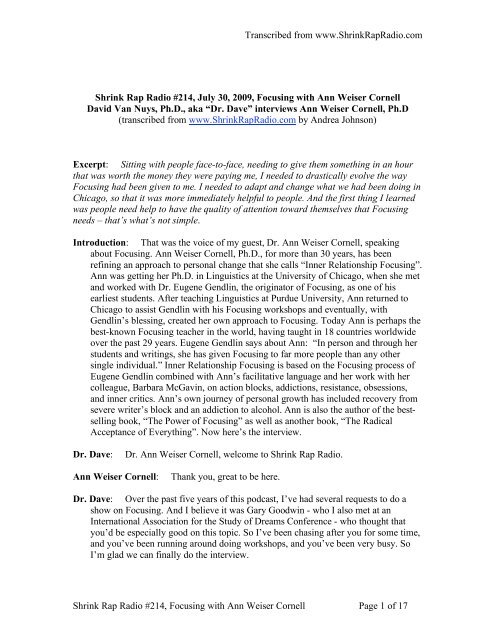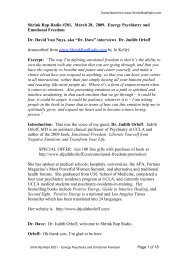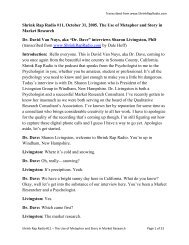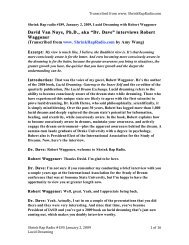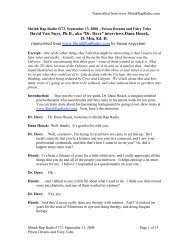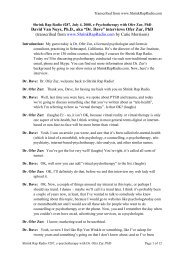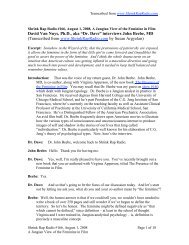214 â Focusing With Ann Weiser Cornell - Shrink Rap Radio
214 â Focusing With Ann Weiser Cornell - Shrink Rap Radio
214 â Focusing With Ann Weiser Cornell - Shrink Rap Radio
You also want an ePaper? Increase the reach of your titles
YUMPU automatically turns print PDFs into web optimized ePapers that Google loves.
Transcribed from www.<strong>Shrink</strong><strong>Rap</strong><strong>Radio</strong>.com<br />
<strong>Shrink</strong> <strong>Rap</strong> <strong>Radio</strong> #<strong>214</strong>, July 30, 2009, <strong>Focusing</strong> with <strong>Ann</strong> <strong>Weiser</strong> <strong>Cornell</strong><br />
David Van Nuys, Ph.D., aka “Dr. Dave” interviews <strong>Ann</strong> <strong>Weiser</strong> <strong>Cornell</strong>, Ph.D<br />
(transcribed from www.<strong>Shrink</strong><strong>Rap</strong><strong>Radio</strong>.com by Andrea Johnson)<br />
Excerpt: Sitting with people face-to-face, needing to give them something in an hour<br />
that was worth the money they were paying me, I needed to drastically evolve the way<br />
<strong>Focusing</strong> had been given to me. I needed to adapt and change what we had been doing in<br />
Chicago, so that it was more immediately helpful to people. And the first thing I learned<br />
was people need help to have the quality of attention toward themselves that <strong>Focusing</strong><br />
needs – that’s what’s not simple.<br />
Introduction: That was the voice of my guest, Dr. <strong>Ann</strong> <strong>Weiser</strong> <strong>Cornell</strong>, speaking<br />
about <strong>Focusing</strong>. <strong>Ann</strong> <strong>Weiser</strong> <strong>Cornell</strong>, Ph.D., for more than 30 years, has been<br />
refining an approach to personal change that she calls “Inner Relationship <strong>Focusing</strong>”.<br />
<strong>Ann</strong> was getting her Ph.D. in Linguistics at the University of Chicago, when she met<br />
and worked with Dr. Eugene Gendlin, the originator of <strong>Focusing</strong>, as one of his<br />
earliest students. After teaching Linguistics at Purdue University, <strong>Ann</strong> returned to<br />
Chicago to assist Gendlin with his <strong>Focusing</strong> workshops and eventually, with<br />
Gendlin’s blessing, created her own approach to <strong>Focusing</strong>. Today <strong>Ann</strong> is perhaps the<br />
best-known <strong>Focusing</strong> teacher in the world, having taught in 18 countries worldwide<br />
over the past 29 years. Eugene Gendlin says about <strong>Ann</strong>: “In person and through her<br />
students and writings, she has given <strong>Focusing</strong> to far more people than any other<br />
single individual.” Inner Relationship <strong>Focusing</strong> is based on the <strong>Focusing</strong> process of<br />
Eugene Gendlin combined with <strong>Ann</strong>’s facilitative language and her work with her<br />
colleague, Barbara McGavin, on action blocks, addictions, resistance, obsessions,<br />
and inner critics. <strong>Ann</strong>’s own journey of personal growth has included recovery from<br />
severe writer’s block and an addiction to alcohol. <strong>Ann</strong> is also the author of the bestselling<br />
book, “The Power of <strong>Focusing</strong>” as well as another book, “The Radical<br />
Acceptance of Everything”. Now here’s the interview.<br />
Dr. Dave:<br />
Dr. <strong>Ann</strong> <strong>Weiser</strong> <strong>Cornell</strong>, welcome to <strong>Shrink</strong> <strong>Rap</strong> <strong>Radio</strong>.<br />
<strong>Ann</strong> <strong>Weiser</strong> <strong>Cornell</strong>:<br />
Thank you, great to be here.<br />
Dr. Dave: Over the past five years of this podcast, I’ve had several requests to do a<br />
show on <strong>Focusing</strong>. And I believe it was Gary Goodwin - who I also met at an<br />
International Association for the Study of Dreams Conference - who thought that<br />
you’d be especially good on this topic. So I’ve been chasing after you for some time,<br />
and you’ve been running around doing workshops, and you’ve been very busy. So<br />
I’m glad we can finally do the interview.<br />
<strong>Shrink</strong> <strong>Rap</strong> <strong>Radio</strong> #<strong>214</strong>, <strong>Focusing</strong> with <strong>Ann</strong> <strong>Weiser</strong> <strong>Cornell</strong> Page 1 of 17
Transcribed from www.<strong>Shrink</strong><strong>Rap</strong><strong>Radio</strong>.com<br />
<strong>Ann</strong> <strong>Weiser</strong> <strong>Cornell</strong>: Well I’ve been devoting my life to <strong>Focusing</strong> ever since I<br />
learned it from Eugene Gendlin who developed it. And I have a good time teaching<br />
in different places in the world and really helping people learn this amazing skill.<br />
Dr. Dave: Oh yes, well that does sound enviable. As you mentioned, Dr. Eugene<br />
Gendlin was the creator of <strong>Focusing</strong>. I had the opportunity to meet him, once or<br />
twice, and I’ll say more about that in my comments after our interview. Also I seem<br />
to recall that I took a brief training workshop in the approach quite awhile back from<br />
John Wellwood. Does that ring a bell for you Do you know him<br />
<strong>Ann</strong> <strong>Weiser</strong> <strong>Cornell</strong>:<br />
world.<br />
I know John. I know just about everybody in the <strong>Focusing</strong><br />
Dr. Dave: OK, so I am remembering correctly that he was in the <strong>Focusing</strong> world, or<br />
maybe he still is<br />
<strong>Ann</strong> <strong>Weiser</strong> <strong>Cornell</strong>:<br />
Yeah.<br />
Dr. Dave: OK, well as they say, enough about me. Let’s start out by having you tell<br />
our listeners what <strong>Focusing</strong> is.<br />
<strong>Ann</strong> <strong>Weiser</strong> <strong>Cornell</strong>: Well <strong>Focusing</strong> is a process of awareness of a funny kind of<br />
inner experience called a “felt sense”. So then we need to go on and ask what a felt<br />
sense is, and that’s where it gets very interesting. When Gendlin first did the research<br />
that led to his development of <strong>Focusing</strong>, he noticed that certain psychotherapy clients<br />
were in contact, moment by moment, with something that they weren’t easily able to<br />
put into words. And yet, it was contact with this something that they could feel but<br />
not easily put into words that actually led to therapeutic change. For him, this<br />
connects to his philosophy of what it is to be human, of what change is, and that our<br />
experience is richly-textured. Words like “anger” or “sadness” can’t capture what we<br />
really are from moment to moment. And so, a felt sense is the experience of an<br />
intricate whole “more-than-I-could-say-easily-how-I-am-right-now”. And that’s<br />
what <strong>Focusing</strong> is; <strong>Focusing</strong> is attention to that.<br />
Dr. Dave: You know, I hear crossovers to other approaches as I hear you describe it. I<br />
don’t know if you’re familiar with the work Jim Bugental who recently passed away.<br />
He did something he called “Existential Humanistic Psychotherapy”. And I can’t<br />
recall the term that he used, but again, it was very much about an inner, felt sense.<br />
<strong>Ann</strong> <strong>Weiser</strong> <strong>Cornell</strong>: I’ve heard of him certainly. I have not actually seen his work, so<br />
I don’t know for sure. But I think what Gendlin’s point would be about the felt sense<br />
is that we all have them, and any successful therapy helps people access that.<br />
Dr. Dave: Yes, and that’s probably the commonality there. Tell us a little bit about<br />
Gendlin’s background. Was he trained in a certain tradition What did he evolve out<br />
of to get into this <strong>Focusing</strong> work<br />
<strong>Shrink</strong> <strong>Rap</strong> <strong>Radio</strong> #<strong>214</strong>, <strong>Focusing</strong> with <strong>Ann</strong> <strong>Weiser</strong> <strong>Cornell</strong> Page 2 of 17
Transcribed from www.<strong>Shrink</strong><strong>Rap</strong><strong>Radio</strong>.com<br />
<strong>Ann</strong> <strong>Weiser</strong> <strong>Cornell</strong>: Well let me go all the way back to his childhood because that’s<br />
really an interesting source for this work. Many people may not realize he’s a<br />
Holocaust survivor.<br />
Dr. Dave:<br />
No, I certainly didn’t know that.<br />
<strong>Ann</strong> <strong>Weiser</strong> <strong>Cornell</strong>: Yeah. He was 11-years-old, from an Austrian-Jewish family.<br />
The Nazis marched into Austria, and his father realized he had to get his family out.<br />
And when Gendlin tells the story about those times, it’s as exciting as a thriller. He<br />
keeps saying as he watched his father make these difficult choices, - “Who should I<br />
trust to help us survive and find a way out” - he would see his father tapping his<br />
chest. He would say, “Dad, how did you know not to trust that person” And his Dad<br />
would tap his chest and say, “Something inside here knows.” And so, at this<br />
intensely stressful and dangerous time, that impressionable young boy got the<br />
message of how people got an inner knowing that let’s them know who to trust and<br />
who not to trust. How did his dad do that So fast-forward to his days as a<br />
philosophy student at the University of Chicago. He was fascinated by philosophy,<br />
but what he kept wondering was how do people describe experiencing. And the kind<br />
of philosophy he was interested in was existential phenomenology.<br />
Dr. Dave:<br />
Yes.<br />
<strong>Ann</strong> <strong>Weiser</strong> <strong>Cornell</strong>: Sartre, [9:38], and Merleau-Ponty. So he heard the rumor that<br />
over in the Psychology department, headed by Carl Rogers - who we’ve all heard of<br />
- they were describing people’s experiences. As he tells it, he sneaked in and<br />
pretended to be a client, so he could pick up some of the study papers that were lying<br />
around, and soon after that became a real client of Carl Rogers. And he didn’t stop<br />
being a philosophy student, but he became a psychology student as well. And so, he<br />
was a student, a client of Carl Rogers and later a close colleague.<br />
Dr. Dave:<br />
Oh, I didn’t know that background, that’s very interesting.<br />
<strong>Ann</strong> <strong>Weiser</strong> <strong>Cornell</strong>:<br />
Yeah.<br />
Dr. Dave: And it’s not surprising to hear that sort of existential, humanistic,<br />
philosophical background. That would be the commonality with, as you say, Rogers<br />
and Bugental, and some of the other approaches where I’m sensing that resonance;<br />
for example, Gestalt therapy, Back when I read Gendlin’s 1982 book, which I think<br />
was titled “<strong>Focusing</strong>”, I had the impression that there was a lot in common with<br />
Gestalt therapy because of the emphasis on immediacy, the here and now, and<br />
paying attention to what’s going on in one’s body…<br />
<strong>Ann</strong> <strong>Weiser</strong> <strong>Cornell</strong>:<br />
Definitely.<br />
<strong>Shrink</strong> <strong>Rap</strong> <strong>Radio</strong> #<strong>214</strong>, <strong>Focusing</strong> with <strong>Ann</strong> <strong>Weiser</strong> <strong>Cornell</strong> Page 3 of 17
Transcribed from www.<strong>Shrink</strong><strong>Rap</strong><strong>Radio</strong>.com<br />
Dr. Dave: …And how it changes from moment to moment. But it sounds like Gendlin<br />
came up with a very similar idea, but also independently.<br />
<strong>Ann</strong> <strong>Weiser</strong> <strong>Cornell</strong>: Mm-hmm. You need to have that kind of philosophical<br />
background and even maybe that Holocaust background. He’s really an amazing and<br />
unique person. I don’t think anyone else has exactly described a felt sense with the<br />
philosophical concept that so much of our experiencing is implicit until it’s<br />
described. And that’s quite different from Freud’s view, which is still very common<br />
in our popular culture, which is that we have buried or stored our emotional<br />
experience. Gendlin says, no, we don’t have a storage model. You don’t have<br />
repressed anger or buried sadness. Instead those experiences are implicit; they’re<br />
unfinished. He literally says: “Pathology is the lack of a further experiencing”.<br />
Experiencing has been stopped somehow, and in the presence of a therapeutic other<br />
that experiencing can begin to resume again. So, yes, the commonalities are there,<br />
and I think no one else quite has that felt sense, which is this rich, intricate, implicit<br />
experiencing that can be tapped into.<br />
Dr. Dave: What about all of the emphasis these days on mindfulness That seems to<br />
me to be another place of potential crossover.<br />
<strong>Ann</strong> <strong>Weiser</strong> <strong>Cornell</strong>: I’m excited to see so much emphasis on mindfulness. I think<br />
that <strong>Focusing</strong> and mindfulness walk quite a long ways down the same path together.<br />
But I’ve heard people say <strong>Focusing</strong> is mindfulness, and I think those people may not<br />
understand the concept of the felt sense. It’s not simply awareness of whatever is<br />
here. It’s awareness of a very particular formation, the felt sense of a situation that<br />
has intricacy to it, and then symbolizing that. Mindfulness doesn’t go into the<br />
importance of symbolization as a carrying forward of implicit experiencing.<br />
Dr. Dave:<br />
What do you mean by symbolization<br />
<strong>Ann</strong> <strong>Weiser</strong> <strong>Cornell</strong>:<br />
Well I mean something as simple as putting it into words…<br />
Dr. Dave:<br />
OK.<br />
<strong>Ann</strong> <strong>Weiser</strong> <strong>Cornell</strong>: …Or finding an image for it. So when I’m in contact with my<br />
felt sense, I then stay with my awareness of it, and begin to put it into words. In one<br />
famous story of a client, Gendlin describes his client who comes into the office:<br />
“Why don’t I get a good relationship Why don’t I hand in my papers” And he<br />
helped her to get the fresh, right now sense of it, and the words were “I pull back.”<br />
And no other words quite fit. That’s it. That brings a kind of relief: “I pull back.”<br />
And by then, inviting her to sit with “the pull back”, as he calls it, - he makes into<br />
“the pull back” - she’s then able to make a big change. It reveals itself to be a part of<br />
her that’s been in hiding, not wanting to be crushed by being brought out into the<br />
open. So the symbolizing dances with the sensing. The person who’s focusing senses<br />
and then symbolizes. And then, they check the symbolizing back with the felt<br />
experience, and that carries the whole process forward.<br />
<strong>Shrink</strong> <strong>Rap</strong> <strong>Radio</strong> #<strong>214</strong>, <strong>Focusing</strong> with <strong>Ann</strong> <strong>Weiser</strong> <strong>Cornell</strong> Page 4 of 17
Transcribed from www.<strong>Shrink</strong><strong>Rap</strong><strong>Radio</strong>.com<br />
Dr. Dave:<br />
OK. Are there particular conditions that <strong>Focusing</strong> is especially good for<br />
<strong>Ann</strong> <strong>Weiser</strong> <strong>Cornell</strong>:<br />
No.<br />
Dr. Dave:<br />
(laughs) Is it good for everything<br />
<strong>Ann</strong> <strong>Weiser</strong> <strong>Cornell</strong>: I would say, yeah. Let me just come right in here and say<br />
<strong>Focusing</strong> is a human process. <strong>With</strong>in the therapeutic context, it’s a client process. So<br />
it isn’t something a therapist does to a client. It’s not even a technique or a method.<br />
The method would be called <strong>Focusing</strong>-oriented Therapy. But <strong>Focusing</strong> itself has<br />
been found in every culture. When you study therapy tapes of every kind of therapy,<br />
you can hear the clients doing <strong>Focusing</strong> naturally. So humans have <strong>Focusing</strong>. Now<br />
there are certainly people, who may be in therapy, who may be at a stage where<br />
being invited to do <strong>Focusing</strong>, they wouldn’t be ready for that. They wouldn’t feel<br />
safe enough. It wouldn’t be the right moment in the process for them to do it. But<br />
that’s something that we can’t categorize by a certain type of person or a certain<br />
diagnosis. No, it’s something that can be sensed in the interactional space.<br />
Dr. Dave: Something that I’ve heard and would like your impression about is that<br />
<strong>Focusing</strong> is good as an adjunctive tool, but it’s not really a complete psychotherapy<br />
in itself.<br />
<strong>Ann</strong> <strong>Weiser</strong> <strong>Cornell</strong>: Yeah, I think that’s right. I think that’s just what I was trying to<br />
point to there. <strong>Focusing</strong> isn’t even a technique at all. So facilitating <strong>Focusing</strong> in the<br />
client would be one thing that a therapist would include in their repertoire. And yet,<br />
there’s also a way of doing any therapeutic method, any modality, in a <strong>Focusing</strong>oriented<br />
way. You can do <strong>Focusing</strong>-oriented, cognitive-behavioral therapy. You can<br />
do <strong>Focusing</strong>-oriented, psychoanalytical therapy. By making sure of each move you<br />
make, you’ve then invited the person to check with their experiencing of that, and<br />
sense what kind of self-impact that makes. You can say <strong>Focusing</strong> is more like water -<br />
it’s essential to life, but you don’t make a meal of it.<br />
Dr. Dave: (laughs) OK, that’s a good metaphor. So it’s not a whole system in and of<br />
itself, and yet there’s enough to it that you do workshops and trainings in it for many<br />
years now.<br />
<strong>Ann</strong> <strong>Weiser</strong> <strong>Cornell</strong>: Well, yes. My workshops are to teach people <strong>Focusing</strong> as a<br />
method for them to use for themselves. And I work with therapists as well. And<br />
when I do, I invite therapists to first learn <strong>Focusing</strong> for themselves. And we teach<br />
also something called <strong>Focusing</strong>-oriented Therapy. And what we say is to do<br />
<strong>Focusing</strong>-oriented Therapy, first of all, the therapist is <strong>Focusing</strong>. So, if, when you’re<br />
sitting across from a client, you have your own felt sense - who would do this, right<br />
You’re not just relying on textbooks, and formulas, and techniques. You’re there<br />
present as a whole person with the client. Well learning <strong>Focusing</strong> as a method for<br />
one’s self helps you do that.<br />
<strong>Shrink</strong> <strong>Rap</strong> <strong>Radio</strong> #<strong>214</strong>, <strong>Focusing</strong> with <strong>Ann</strong> <strong>Weiser</strong> <strong>Cornell</strong> Page 5 of 17
Transcribed from www.<strong>Shrink</strong><strong>Rap</strong><strong>Radio</strong>.com<br />
Dr. Dave: Sure. It seems like the ability to be really present in the therapeutic session,<br />
really present with yourself, and somehow, therefore, at the same time, really present<br />
for that other person, really means a lot.<br />
<strong>Ann</strong> <strong>Weiser</strong> <strong>Cornell</strong>: Of course. And we know that to be true, and we are often<br />
advised or told to do that. I help people with the how to do that.<br />
Dr. Dave:<br />
Yeah, it sounds so easy to say, “Be a good listener.”<br />
<strong>Ann</strong> <strong>Weiser</strong> <strong>Cornell</strong>: (laughs) That’s right. But how<br />
Dr. Dave: But in practice, it’s so hard. It can be very challenging. I think to some<br />
people, it just comes very naturally.<br />
<strong>Ann</strong> <strong>Weiser</strong> <strong>Cornell</strong>:<br />
doing. (laughs)<br />
Right, and then they can’t describe very well what they’re<br />
Dr. Dave:<br />
Yeah, certainly not to all of us, it doesn’t come that easily.<br />
<strong>Ann</strong> <strong>Weiser</strong> <strong>Cornell</strong>: That’s right. So many of the things that we’re advised to do - be<br />
a good listener, be present, accept yourself - I feel like in the <strong>Focusing</strong> world, we’ve<br />
developed specifically how to do that. We can show you step-by-step.<br />
Dr. Dave: Well maybe we can go through some of those steps as we go along here. I<br />
know that in your work, you’ve evolved <strong>Focusing</strong> over time. You’ve even got a<br />
recent book called “The Radical Acceptance of Everything”. Maybe before we talk<br />
about the book, say a little bit about the elements you’ve introduced into the mix in<br />
the process of evolving <strong>Focusing</strong>.<br />
<strong>Ann</strong> <strong>Weiser</strong> <strong>Cornell</strong>: Well what struck me immediately when I first learned it, which<br />
was 37 years ago, was that it wasn’t so easy for me to do. I think that ultimately<br />
made me a very good teacher of it.<br />
Dr. Dave:<br />
Sure, because you had to break it down and understand it.<br />
<strong>Ann</strong> <strong>Weiser</strong> <strong>Cornell</strong>: I wasn’t one of those natural Focusers. The fact that I had to<br />
struggle to learn it gave me a lot of insight into what people needed in order to learn<br />
it.<br />
Dr. Dave:<br />
Yes.<br />
<strong>Ann</strong> <strong>Weiser</strong> <strong>Cornell</strong>: And by the way, I wasn’t studying to be a therapist. I was a<br />
student of Linguistics when I first encountered Gendlin at the University of Chicago,<br />
at a free community meeting and learned <strong>Focusing</strong> only for myself. No one thought<br />
there would be such a profession as a <strong>Focusing</strong> teacher. So who knew where that<br />
<strong>Shrink</strong> <strong>Rap</strong> <strong>Radio</strong> #<strong>214</strong>, <strong>Focusing</strong> with <strong>Ann</strong> <strong>Weiser</strong> <strong>Cornell</strong> Page 6 of 17
Transcribed from www.<strong>Shrink</strong><strong>Rap</strong><strong>Radio</strong>.com<br />
would ever lead. I really wanted self-awareness. I wanted freedom from the suffering<br />
of being 22-years-old and having come from a dysfunctional, alcoholic family, and<br />
never having done any introspection before. And it was amazing what <strong>Focusing</strong> did<br />
for me, even back then.<br />
Dr. Dave: Maybe you could say a little bit more about that. Say a little bit about how<br />
that process worked for you.<br />
<strong>Ann</strong> <strong>Weiser</strong> <strong>Cornell</strong>: OK. And first, I should probably say that what Gendlin was<br />
teaching in this community meeting was for people to be peer counselors, so we<br />
learned how to be <strong>Focusing</strong> partners.<br />
Dr. Dave:<br />
Yes.<br />
<strong>Ann</strong> <strong>Weiser</strong> <strong>Cornell</strong>: I never worked with him directly. He taught the group, and then<br />
we practiced with each other. And so, it’s also a model of community healing that<br />
people can do in pairs with each other, and that’s how I teach it to this day.<br />
Dr. Dave:<br />
OK.<br />
<strong>Ann</strong> <strong>Weiser</strong> <strong>Cornell</strong>: So here I was 22-years-old, practicing and exchanging the skills<br />
of <strong>Focusing</strong> and empathic listening, eight hours a week, with four different <strong>Focusing</strong><br />
partners every week, and encountering myself. I discovered I had a self; I had<br />
insides. My background up until that time was of living in a dysfunctional, alcoholic<br />
family in the Midwest, where denial is the way of life. I could tell you how<br />
everybody else was feeling in a room and had no clue about how I felt.<br />
Dr. Dave:<br />
Yes.<br />
<strong>Ann</strong> <strong>Weiser</strong> <strong>Cornell</strong>: So it was a journey of discovery. And it was a self-guided<br />
journey of discovery. My friends were there simply saying back to me what they<br />
heard me say, and it was gorgeous. It was intense. It was hard, but I ultimately, stepby-step,<br />
got myself back. I could tell you how I felt. I got closer and closer to being<br />
able to tell how I felt moment to moment; it took months. I remember when I got up<br />
to being able to tell what I had felt two hours before. (laughs)<br />
Dr. Dave: (laughs) Well that’s true for a lot of us. We don’t know until later, when<br />
we’re brushing our teeth: “I should have said such-and-such.” (laughs)<br />
<strong>Ann</strong> <strong>Weiser</strong> <strong>Cornell</strong>:<br />
the time.”<br />
That’s right. Or, “Ouch, that hurt what she said and I smiled at<br />
Dr. Dave:<br />
Yes.<br />
<strong>Ann</strong> <strong>Weiser</strong> <strong>Cornell</strong>:<br />
And so, I love being current with myself, and that’s one of the<br />
<strong>Shrink</strong> <strong>Rap</strong> <strong>Radio</strong> #<strong>214</strong>, <strong>Focusing</strong> with <strong>Ann</strong> <strong>Weiser</strong> <strong>Cornell</strong> Page 7 of 17
Transcribed from www.<strong>Shrink</strong><strong>Rap</strong><strong>Radio</strong>.com<br />
gifts <strong>Focusing</strong> gave me almost immediately, within the first year. <strong>Focusing</strong> has given<br />
me the gift of being able to make decisions that were right for me, rather than being<br />
the logical thing to do, or society’s right thing to do. For example, I was supposed to<br />
be a Linguistics teacher. I got a Ph.D. in Linguistics; I got fellowships where I<br />
promised I would be a teacher. But I already had <strong>Focusing</strong> by the time I started<br />
teaching Linguistics, and I could tell that it felt wrong. And very quickly, I got out of<br />
there without knowing what I was going to do instead. I took the leap because I<br />
could trust that inner sense of wrongness and rightness that <strong>Focusing</strong> had enabled me<br />
to have.<br />
Dr. Dave:<br />
Wonderful.<br />
<strong>Ann</strong> <strong>Weiser</strong> <strong>Cornell</strong>:<br />
Yeah.<br />
Dr. Dave:<br />
That’s great.<br />
<strong>Ann</strong> <strong>Weiser</strong> <strong>Cornell</strong>:<br />
evolved, yeah<br />
So where were we (laughs) I was telling you about how I’ve<br />
Dr. Dave:<br />
care.<br />
Yeah, and we were talking about how <strong>Focusing</strong> has evolved under your<br />
<strong>Ann</strong> <strong>Weiser</strong> <strong>Cornell</strong>: Right. So since I’m telling you my life story, I’ll tell you the<br />
next step. I left teaching Linguistics, and by that time Gendlin’s book had been<br />
published, and he invited me to teach with him.<br />
Dr. Dave:<br />
That must have been wonderful.<br />
<strong>Ann</strong> <strong>Weiser</strong> <strong>Cornell</strong>: So that’s when the profession of <strong>Focusing</strong> teaching began. As<br />
his book got more and more popular, people kept calling him from all over the world<br />
to say: “When’s your next workshop”, and we’d be giving these workshops every<br />
few months. And then I moved to California, in 1983, thinking: “Oh no, I’m leaving<br />
the center of the world for <strong>Focusing</strong>”, which was Chicago at that time. But actually it<br />
was the best thing that could have happened for me. I wanted to be an independent<br />
<strong>Focusing</strong> teacher in California. I put my ads in “Open Exchange” and “Common<br />
Ground”, and people started showing up. And I had been a therapist in Illinois, but I<br />
didn’t want to be a therapist in California; I wanted to be simply a <strong>Focusing</strong> teacher.<br />
But sitting with people face-to-face, needing to give them something in an hour that<br />
was worth the money they were paying me, I needed to drastically evolve the way<br />
<strong>Focusing</strong> had been given to me. I needed to adapt and change what we had been<br />
doing in Chicago, so that it was more immediately helpful to people. And the first<br />
thing I learned was people need help to have the quality of attention toward<br />
themselves that <strong>Focusing</strong> needs – that’s what’s not simple. So <strong>Focusing</strong> needs us to<br />
be non-judgmental, accepting, and have a curious, open, aware attitude, or we can’t<br />
even do the simple sensing and describing that <strong>Focusing</strong> needs. So we needed almost<br />
some pre-<strong>Focusing</strong> because so many people, as we know, are not in that state with<br />
<strong>Shrink</strong> <strong>Rap</strong> <strong>Radio</strong> #<strong>214</strong>, <strong>Focusing</strong> with <strong>Ann</strong> <strong>Weiser</strong> <strong>Cornell</strong> Page 8 of 17
Transcribed from www.<strong>Shrink</strong><strong>Rap</strong><strong>Radio</strong>.com<br />
their own experiencing at all. Instead people are evaluating how they feel. We’re<br />
judging how we feel. We’re trying to fix how we feel. And that led me to understand<br />
that what I needed to concentrate on with people was their quality of relationship<br />
with their own inner experience, and I began to call it ”Inner Relationship”. So what<br />
can I do to help people move into a relationship with themselves that’s nonjudgmental,<br />
accepting, open, and curious<br />
Dr. Dave:<br />
Yes, that makes a lot of sense to me.<br />
<strong>Ann</strong> <strong>Weiser</strong> <strong>Cornell</strong>: It does. And that really is what became my main focus. And I<br />
evolved a kind of language that people can use themselves that enables them to move<br />
into that state. I began to calling it the “state of presence”, presence being the ability<br />
to be with whatever arises in you. You can be in presence, or you can be out of<br />
presence.<br />
Dr. Dave:<br />
Yes.<br />
<strong>Ann</strong> <strong>Weiser</strong> <strong>Cornell</strong>: Out of presence is identification with a part of ourselves. So if<br />
I’m identified with emotional experience, if I’m saying things like, “I’m angry” or “I<br />
hate this feeling”, then I’m not going to be able to get the <strong>Focusing</strong> from there.<br />
Unless I get some help, or I help myself dis-identify, to say, “Something in me is<br />
angry” or “Something in me doesn’t like this feeling”, and then that little shift is<br />
actually huge in the inner world.<br />
Dr. Dave: Now it sounds like this might lead into your book, which you call “The<br />
Radical Acceptance of Everything”.<br />
<strong>Ann</strong> <strong>Weiser</strong> <strong>Cornell</strong>:<br />
Exactly. Now you see where that title comes in. (laughs)<br />
Dr. Dave:<br />
Yeah. So the question arises how does one accept everything<br />
<strong>Ann</strong> <strong>Weiser</strong> <strong>Cornell</strong>: Exactly. How does one accept everything And just to be sure<br />
we understand each other and people understand what I mean by accepting<br />
everything, I’m not talking about accepting everything that happens in the outer<br />
world – that would not be my department. But if we just look at the inner world, the<br />
radical acceptance of everything that arises in us - our thoughts, our feelings, our<br />
emotions, our reactions - that can be done, and it’s the fastest way to transformation.<br />
What I see as really tragic is that people get locked into the attempt to change<br />
themselves by disrespecting themselves, by not accepting: “I can’t accept that<br />
because it’s got to change” - that type of attitude. You know, I work with a lot now<br />
with people who have what I call “action blocks”: “I can’t get my paper written.” “I<br />
can’t get my resume polished up to send out for a new job”, and that sort of thing.<br />
Dr. Dave:<br />
Right.<br />
<strong>Ann</strong> <strong>Weiser</strong> <strong>Cornell</strong>:<br />
And it turns out you can invite the part of you that’s not getting<br />
<strong>Shrink</strong> <strong>Rap</strong> <strong>Radio</strong> #<strong>214</strong>, <strong>Focusing</strong> with <strong>Ann</strong> <strong>Weiser</strong> <strong>Cornell</strong> Page 9 of 17
Transcribed from www.<strong>Shrink</strong><strong>Rap</strong><strong>Radio</strong>.com<br />
the paper written, the part of you that’s not wanting to get the resume polished. And<br />
if you do <strong>Focusing</strong> with that and get a felt sense of it, get interested in it, and let it<br />
tell its story, transformation happens. Life starts to move. The blocked, stuck places<br />
start to open up. But, so often, what I need to help people do first is turn toward the<br />
other part of them, the one that’s anxious, urgent, worried. “I can’t accept that.” “I<br />
can’t be nice to that.” “I can’t listen to that because it is my enemy.” And what I’ve<br />
discovered through working with this material, over 37 years - if you count the years,<br />
in which I worked with myself - there are no enemies inside. There is nothing in us,<br />
in each of us, that’s trying to hurt us. Everything’s trying to save our life. I don’t<br />
even believe in the concept of self-sabotage because if you say it that way, it sounds<br />
like there’s a part of you trying to hurt you. We’ll say, “I’m sabotaging myself.”<br />
They’re not.<br />
Dr. Dave:<br />
How do you account for the stuff that looks like that<br />
<strong>Ann</strong> <strong>Weiser</strong> <strong>Cornell</strong>:<br />
Thanks for that great question.<br />
Dr. Dave:<br />
(laughs) OK.<br />
<strong>Ann</strong> <strong>Weiser</strong> <strong>Cornell</strong>: Let me take my own example. I used my brand of <strong>Focusing</strong>,<br />
which I call Inner Relationship <strong>Focusing</strong>, to relieve a really severe writer’s block.<br />
And partly what I mean by severe is that I yearned to write, I longed to write, and I<br />
felt like it was my destiny to write, and I just couldn’t.<br />
Dr. Dave:<br />
Oh, I’ve been there. I can relate to that. (laughs)<br />
<strong>Ann</strong> <strong>Weiser</strong> <strong>Cornell</strong>:<br />
(laughs) And you can agree, can’t you, that it’s really painful…<br />
Dr. Dave:<br />
Oh yes.<br />
<strong>Ann</strong> <strong>Weiser</strong> <strong>Cornell</strong>: …To feel like what’s right in front of you, your very path to<br />
your life fulfillment is exactly what you can’t do. And no wonder in our frustration<br />
with such a situation, concepts like self-sabotage come up. So the story was that I sat<br />
down to do <strong>Focusing</strong> with this issue and invited the part of me that didn’t want to<br />
write. Not being in touch with it at that moment, but just by inference - since I<br />
longed to write and I’m not writing - there must be a part of me that doesn’t want to<br />
write. I didn’t know what was going to happen. But in response to my invitation -<br />
I’m also sensing in my body at this point because that’s where we get these felt<br />
senses – I began to feel something. The part of me that doesn’t want to write was<br />
showing up in my body at that moment as a kind of constriction. And notice it’s not<br />
so easy to describe; I can’t be glib in what was being found there. I felt it, but I<br />
couldn’t easily describe it; that’s what felt senses are like. So there, maybe in the<br />
chest, something like a pulling forward or constriction, and I stayed with it. And as I<br />
stayed with it, more began to come. It showed me it wasn’t just constriction. It was<br />
like ducking. It was trying to pull my body over into a ducking motion. And as I<br />
stayed with that I began to get the image of a target range. It was as if this place<br />
<strong>Shrink</strong> <strong>Rap</strong> <strong>Radio</strong> #<strong>214</strong>, <strong>Focusing</strong> with <strong>Ann</strong> <strong>Weiser</strong> <strong>Cornell</strong> Page 10 of 17
Transcribed from www.<strong>Shrink</strong><strong>Rap</strong><strong>Radio</strong>.com<br />
inside me that didn’t want me to write felt I was on a shooting range down by the<br />
target…<br />
Dr. Dave:<br />
Oh yes.<br />
<strong>Ann</strong> <strong>Weiser</strong> <strong>Cornell</strong>: …And it was trying to pull me over to duck. And this was all<br />
new to me; I didn’t know any of this. So I stayed with it with this attitude of<br />
interested acceptance. And then, it started showing me memories of what it had been<br />
like to live with my sarcastic father, and that was like being shot at. And then, in the<br />
process of Inner Relationship <strong>Focusing</strong>, we then really let it know we hear it. So I<br />
said, “Oh, I really see. I hear what you’re showing me. Oh, no wonder.” “No<br />
wonder” is also a great phrase I like to use. “No wonder you’ve been stopping me<br />
from writing, if that’s what you don’t want to have happen to me again.” And I felt a<br />
release in my body when I did. The constriction released. There was a fresh, warm<br />
flow of energy in the place where it had been, and writing was easier. Now I won’t<br />
say one session changed everything; I had a number of sessions about such an<br />
entrenched issue as that one, but it was part of the answer. And I’m telling you that<br />
story now to give you an example of what we mean when we say something can look<br />
like self-sabotage. From the outside, we can be mystified, “Why I want to write. I<br />
know my destiny is to write. Every good thing would come from writing. Why<br />
would something in me not want to” And then, it turns out there’s a part that<br />
believes that will lead to something that will hurt you.<br />
Dr. Dave:<br />
Yeah, that’s a great illustration.<br />
<strong>Ann</strong> <strong>Weiser</strong> <strong>Cornell</strong>: Mm-hmm. And I could know the answer, and I could know<br />
Intellectually, it’s because it doesn’t want me to be criticized. But it’s different when<br />
you do it from the inside as a freshly-encountered, felt experience – then something<br />
shifts.<br />
Dr. Dave:<br />
Yeah, that’s a subtle but important distinction, isn’t it<br />
<strong>Ann</strong> <strong>Weiser</strong> <strong>Cornell</strong>:<br />
Mm-hmm.<br />
Dr Dave: I’m struck by the fact that you were able to do that work with yourself. I<br />
know sometimes I find it difficult to do that sort of a process with myself, with<br />
myself, by myself. It seems to help me to have somebody else there who’s going to<br />
keep me - it’s hard to avoid using the word “focused” all the time - focused or<br />
directed.<br />
<strong>Ann</strong> <strong>Weiser</strong> <strong>Cornell</strong>: I’m really happy you noticed. What was missing in my<br />
story is that there was somebody else there, and just to keep it simple, I didn’t<br />
mention there was a <strong>Focusing</strong> partner. So that other person wasn’t making<br />
suggestions and wasn’t giving me input. That other person was simply reflecting<br />
back to me my experiencing, and helping create a safe space for me to do that work.<br />
<strong>Shrink</strong> <strong>Rap</strong> <strong>Radio</strong> #<strong>214</strong>, <strong>Focusing</strong> with <strong>Ann</strong> <strong>Weiser</strong> <strong>Cornell</strong> Page 11 of 17
Transcribed from www.<strong>Shrink</strong><strong>Rap</strong><strong>Radio</strong>.com<br />
And believe me, it would have been pretty much impossible for me to do it without<br />
another person in there.<br />
Dr. Dave:<br />
Yeah.<br />
<strong>Ann</strong> <strong>Weiser</strong> <strong>Cornell</strong>:<br />
Another person really adds something very important.<br />
Dr. Dave:<br />
Yeah, somehow it helps to keep you on the dime.<br />
<strong>Ann</strong> <strong>Weiser</strong> <strong>Cornell</strong>: It does.<br />
Dr. Dave:<br />
Yeah.<br />
<strong>Ann</strong> <strong>Weiser</strong> <strong>Cornell</strong>: The presence of another person is magical and very, very, very<br />
empowering. As long as that person isn’t interfering and bringing in something from<br />
outside the mix in a way that you can feel isn’t helpful.<br />
Dr. Dave:<br />
Mm-hmm.<br />
<strong>Ann</strong> <strong>Weiser</strong> <strong>Cornell</strong>: Sometimes it feels good to get some kind of input and opinion -<br />
“Oh, what would you do” - but then we need time to take that inside and check if it<br />
fits. So they need to not be doing too much. So it’s the Focuser, the person doing the<br />
<strong>Focusing</strong> on their own experiencing, who puts the check on that.<br />
Dr. Dave: OK. Well you’ve just given us a good illustration of working with what you<br />
call action blocks. And I notice you’ve also described as working with addictions,<br />
resistance, obsessions, and inner critics.<br />
<strong>Ann</strong> <strong>Weiser</strong> <strong>Cornell</strong>:<br />
That’s right.<br />
Dr. Dave:<br />
Do you want to say something about those other sorts of issues<br />
<strong>Ann</strong> <strong>Weiser</strong> <strong>Cornell</strong>: (laughs) Well they all have something important in common. In<br />
fact, you can see addictions as the inverse of action blocks. So an action block is<br />
when there’s something that you’d like to be doing, but you’re not doing it. And an<br />
addiction is when there’s something that you’d like to stop doing, but you’re not<br />
stopping it.<br />
Dr. Dave:<br />
OK.<br />
<strong>Ann</strong> <strong>Weiser</strong> <strong>Cornell</strong>: So they’re both about action really; either blocked action, or<br />
you could say “out of control” action. And I’ve certainly had my own history with<br />
addiction as well. One of the real sources of my more recent work with Inner<br />
Relationship <strong>Focusing</strong> is my own recovery from addiction to alcohol. And<br />
understanding that what had been happening, when I was within the tangle of<br />
drinking addictively and arguing with myself, trying to stop it but then doing it,<br />
<strong>Shrink</strong> <strong>Rap</strong> <strong>Radio</strong> #<strong>214</strong>, <strong>Focusing</strong> with <strong>Ann</strong> <strong>Weiser</strong> <strong>Cornell</strong> Page 12 of 17
Transcribed from www.<strong>Shrink</strong><strong>Rap</strong><strong>Radio</strong>.com<br />
saying I should do it – I was caught up in identification with these different parts of<br />
me. What wasn’t there in that tangle or inner struggle was the sense of me as a whole<br />
self, what my colleague, Barbara McGavin and I call “self-in-presence”. So self-inpresence<br />
needed to show up. And it was through realizing I’d been using alcohol<br />
addictively, stopping, and then trying to understand what had happened, that Barbara<br />
McGavin and I began really to develop the part of our work where we work with<br />
some of the most difficult areas that people face.<br />
Dr. Dave:<br />
Well addictions are notoriously difficult.<br />
<strong>Ann</strong> <strong>Weiser</strong> <strong>Cornell</strong>: Addictions are very difficult. And one that we find even more<br />
difficult is something we call unfulfilled desire; longing. But definitely addictions<br />
are difficult. So there’s the part that wants to do the action, the part that wants to do<br />
the behavior, the part that’s trying to stop it, and then self-in-presence. Neither one of<br />
those, not getting identified with, not becoming one part of the other - within the<br />
tangle, within the struggle, there is no way out; it’s a closed system. We need to step<br />
out of that closed system and be the self that can hold that whole system, and the<br />
different parts that are involved with curiosity.<br />
Dr. Dave:<br />
Yes.<br />
<strong>Ann</strong> <strong>Weiser</strong> <strong>Cornell</strong>:<br />
That’s then when <strong>Focusing</strong> can begin.<br />
Dr. Dave: I like your use of the word “tangle” instead of neuroses, or pathology, or<br />
some other heavily-loaded word.<br />
<strong>Ann</strong> <strong>Weiser</strong> <strong>Cornell</strong>:<br />
Exactly.<br />
Dr. Dave:<br />
Tangle really captures it in a nice and nonjudgmental way.<br />
<strong>Ann</strong> <strong>Weiser</strong> <strong>Cornell</strong>: Thank you. Yeah, we’re trying to use that vivid language that<br />
doesn’t make assumptions. We start with a tangle.<br />
Dr. Dave:<br />
Do you have some other great words that you use (laughs)<br />
<strong>Ann</strong> <strong>Weiser</strong> <strong>Cornell</strong>:<br />
(laughs) Probably.<br />
Dr. Dave: I noticed in one place you talked about something you call “facilitative<br />
language”. And with your background as a Linguist, what do you mean by<br />
facilitative language<br />
<strong>Ann</strong> <strong>Weiser</strong> <strong>Cornell</strong>: Oh yes. Facilitative language shows that we can shift our own<br />
experiencing just by shifting the language that we use. And, in particular, we have<br />
something we call “presence language”, where you use five words that change the<br />
experience of being identified with a part of us, to the experience of being able to be<br />
with that, and that begins to make <strong>Focusing</strong> possible. When we’re identified, we<br />
<strong>Shrink</strong> <strong>Rap</strong> <strong>Radio</strong> #<strong>214</strong>, <strong>Focusing</strong> with <strong>Ann</strong> <strong>Weiser</strong> <strong>Cornell</strong> Page 13 of 17
Transcribed from www.<strong>Shrink</strong><strong>Rap</strong><strong>Radio</strong>.com<br />
can’t do <strong>Focusing</strong>; that’s what I was discovering when I first worked with it<br />
independently. But presence language, five words: “I’m sensing something in me.”<br />
So we start with a phrase like, “I’m angry” or “I’m angry at her”, and then shift to<br />
“I’m sensing something in me is angry at her.” Notice what happens. Taking the<br />
emotional sense like that - “I’m sad about it”, “I’m worried” or “I’m tired” - those<br />
are sentences spoken from an identified position.<br />
Dr. Dave:<br />
And so, you’re frozen in that position.<br />
<strong>Ann</strong> <strong>Weiser</strong> <strong>Cornell</strong>: You’re frozen in that position. It’s what we call merging with<br />
the part of us that has those emotions. And it feels at that moment like that’s all of<br />
you. That’s what emotions do. They narrow our focus. They’re meant to do that.<br />
From an evolutionary stance, having an emotion like anger, you need to narrow your<br />
focus so you can fight or flee, or whatever you need to do. But it isn’t helpful to stay<br />
in an emotional position if all you want to do is understand what’s going, and be able<br />
to communicate about it to the people involved. So how do we step back from<br />
emotional identification into being with that part of us that has the emotion When I<br />
was growing up in the Midwest, we had only two ways to be emotion experience.<br />
Our favorite way was denial, which was, “No sweetie, I’m not angry” - my mother.<br />
“No sweetie, I’m not angry with you. I’m just terribly disappointed.”<br />
Dr. Dave:<br />
(laughs)<br />
<strong>Ann</strong> <strong>Weiser</strong> <strong>Cornell</strong>:<br />
(laughs)<br />
Dr. Dave:<br />
I can hear your mother in there.<br />
<strong>Ann</strong> <strong>Weiser</strong> <strong>Cornell</strong>: (laughs) And in the child’s body, you know that’s a lie, but it’s<br />
very confusing, because you’re never going to get them to know it anyway. So<br />
identification with an emotion is a narrow experience; it’s a partial experience. What<br />
we need is to step back away from identification, but not through denial of it. We<br />
stay in presence with the emotional experience, and yet, identify with something<br />
larger than that. So that’s why we call this presence language. So not “I’m angry”,<br />
but “I’m sensing something in me is angry”; and when you do that you begin to be<br />
able to feel it. This is something I do in my classes. I invite people to start with a<br />
sentence that is an identified language – “I’m angry”, “I’m upset”, “I’m bored”, “I’m<br />
tired” - something they feel at the moment or they’ve recently felt. Then I have them<br />
shift to, “I’m sensing something in me is bored…or tired…or worried”. And notice<br />
what happens when you just change your language. “I’m sensing something in me is<br />
a bit nervous.” And what often happens is you get introspective at that moment.<br />
Instead of being caught up in something and ready to act out of it, you turn toward it,<br />
and you start to get curious. This is a huge shift, one that enables us to access more<br />
of our available intelligence. It enables us to meet others in a way that makes them<br />
more likely to be open to us. Feel the difference between “I’m angry at you”, and<br />
“I’m sensing something in me is angry at you.” Our relationships get better, plus,<br />
we’ve taken the first step toward a process of self-awareness. “I’m sensing<br />
<strong>Shrink</strong> <strong>Rap</strong> <strong>Radio</strong> #<strong>214</strong>, <strong>Focusing</strong> with <strong>Ann</strong> <strong>Weiser</strong> <strong>Cornell</strong> Page 14 of 17
Transcribed from www.<strong>Shrink</strong><strong>Rap</strong><strong>Radio</strong>.com<br />
something in me is angry.” “Actually now that I’ve said that much, it’s not so much<br />
angry, it’s more like…” Then there’s an evolutionary process. Emotions evolve once<br />
you start sensing how you feel from what we call self-in-presence, from a larger<br />
perspective. The emotions evolve. I think a lot of the ways people speak about<br />
emotions these days is they assume it’s not going to change. Emotions are spoken of<br />
like furniture - “I need to get over that anger” or “I need to get around that sadness”,<br />
or get through that - instead of treating them like “e-motions”, something that is<br />
process, or something will change when you spend time with it.<br />
Dr. Dave: Interesting. In some ways, it sounds like Buddhist meditation, where you’re<br />
invited to watch your feelings come and go and change, but without judgment and<br />
without attachment. But you’re adding something extra, which is some intention to<br />
do something about it, somehow.<br />
<strong>Ann</strong> <strong>Weiser</strong> <strong>Cornell</strong>:<br />
There’s an intention to get to know it better.<br />
Dr. Dave:<br />
OK.<br />
<strong>Ann</strong> <strong>Weiser</strong> <strong>Cornell</strong>: As we were saying earlier about mindfulness, the process of<br />
Inner Relationship <strong>Focusing</strong> walks down the path quite a long way with Buddhist<br />
meditation, especially what’s called vipassana, or mindfulness meditation, where you<br />
are noticing body awareness as part of what you’re noticing arise and fall. But with<br />
<strong>Focusing</strong>, you’re staying engaged. There’s a relationship there, a relationship with<br />
curiosity and interest. It’s more personal; more intra-personal and more personal in<br />
an inner way. And so, there’s an exploration; there’s a getting to know better. And<br />
with Gendlin’s original concept of what a felt sense is, we understand that once you<br />
have interested contact with what you’re feeling, it always evolves. There’s no such<br />
thing as feelings being like objects. They are always in a process of evolution when<br />
we bring awareness to them in this nonjudgmental way. When our feelings seem to<br />
stay the same, year after year, it’s because they haven’t had an open, nonjudgmental<br />
awareness brought to them in this way that we’re talking about.<br />
Dr. Dave: Now I seem to recall from Gendlin’s book that part of his process was to<br />
also have an image emerge, almost like a visual image that somehow captures the<br />
essence of the feeling. And an example of that in the story that you told was the<br />
target.<br />
<strong>Ann</strong> <strong>Weiser</strong> <strong>Cornell</strong>:<br />
Yes.<br />
Dr. Dave:<br />
And is that still a part of your work<br />
<strong>Ann</strong> <strong>Weiser</strong> <strong>Cornell</strong>: Oh yes, that’s what we call symbolization. But what is<br />
interesting to me is that you can really trust the process to bring that. There’s no need<br />
to invite specifically an image or words, or one or the other. You just open to the<br />
way it wants to express itself. People are delightfully different that way. Some get<br />
lots of images very easily, and they need to be slowed down a bit and brought into<br />
<strong>Shrink</strong> <strong>Rap</strong> <strong>Radio</strong> #<strong>214</strong>, <strong>Focusing</strong> with <strong>Ann</strong> <strong>Weiser</strong> <strong>Cornell</strong> Page 15 of 17
Transcribed from www.<strong>Shrink</strong><strong>Rap</strong><strong>Radio</strong>.com<br />
the body. Others are quite verbal, but their words help them stay with something that<br />
they’re feeling. Others have long periods of silence where they’re simply aware of<br />
something quite kinesthetic. So in terms of the different modes of process – visual,<br />
auditory, kinesthetic, and so on – <strong>Focusing</strong> crosses over all of those. It’s possible to<br />
do it in all those ways.<br />
Dr. Dave: Well this has really been fascinating, and we’re coming to the place where<br />
I think we need to begin to wind down. What’s your recommendation to any current<br />
or would-be therapist, who might wish to have training in <strong>Focusing</strong><br />
<strong>Ann</strong> <strong>Weiser</strong> <strong>Cornell</strong>:<br />
Well I give training in <strong>Focusing</strong> to therapists.<br />
Dr. Dave:<br />
Oh my goodness.<br />
<strong>Ann</strong> <strong>Weiser</strong> <strong>Cornell</strong>:<br />
Have a look at my website. (laughs)<br />
Dr. Dave: (laughs) Right, and I’ll put a link to your website. You might want to<br />
mention it right now. What’s the address<br />
<strong>Ann</strong> <strong>Weiser</strong> <strong>Cornell</strong>:<br />
www.<strong>Focusing</strong>Resources.com.<br />
Dr. Dave: OK, that’s easy. What about recommendations for listeners who might wish<br />
to explore <strong>Focusing</strong> as a client I suppose one would be to read your book.<br />
<strong>Ann</strong> <strong>Weiser</strong> <strong>Cornell</strong>: Yeah, and people who might want to visit<br />
www.<strong>Focusing</strong>Resources.com, my website, will see four portals or doorways. One is<br />
for therapists, in particular, and we have some great programs for therapists. One is<br />
for people interested in exploring getting unblocked or working with…I’m forgetting<br />
my own website. Anyway, there are doorways for individuals to explore <strong>Focusing</strong>.<br />
There are doorways for therapists to explore <strong>Focusing</strong>. And my book, “The Power of<br />
<strong>Focusing</strong>” is still in print and is still available. The new one is “The Radical<br />
Acceptance of Everything”.<br />
Dr. Dave:<br />
two.<br />
You really did get over that block, didn’t you You wrote not one book, but<br />
<strong>Ann</strong> <strong>Weiser</strong> <strong>Cornell</strong>:<br />
I write all the time now. It’s completely gone.<br />
Dr. Dave:<br />
Oh, that’s wonderful.<br />
<strong>Ann</strong> <strong>Weiser</strong> <strong>Cornell</strong>: Yeah. So also on the website, there will be free resources and<br />
some free calls that we did, where we take you through some processes. A lot of<br />
articles are there. I have a free e-zine, an e-newsletter. If you want to hear a tidbit<br />
from me once a week, you can sign up for that.<br />
Dr. Dave:<br />
OK, great.<br />
<strong>Shrink</strong> <strong>Rap</strong> <strong>Radio</strong> #<strong>214</strong>, <strong>Focusing</strong> with <strong>Ann</strong> <strong>Weiser</strong> <strong>Cornell</strong> Page 16 of 17
Transcribed from www.<strong>Shrink</strong><strong>Rap</strong><strong>Radio</strong>.com<br />
<strong>Ann</strong> <strong>Weiser</strong> <strong>Cornell</strong>:<br />
We welcome people’s interest.<br />
Dr. Dave:<br />
word<br />
Good. Well is there anything that you’d like to say as we wrap up Any last<br />
<strong>Ann</strong> <strong>Weiser</strong> <strong>Cornell</strong>: Well what I’ve gathered from my journey with focusing, over<br />
37 years, is that we can trust our own inner knowing. And what I love about my<br />
work is that I help people come to trust their inner knowing. So much of our culture<br />
has taken us away from ourselves and draws our attention out into outer authority,<br />
and takes us away from trusting ourselves. So let’s come back to our birthright of<br />
trusting the inner knowing inside ourselves.<br />
Dr. Dave: Well Dr. <strong>Ann</strong> <strong>Weiser</strong> <strong>Cornell</strong>, it’s been delightful speaking with you. And<br />
thank you so much for being my guest today on <strong>Shrink</strong> <strong>Rap</strong> <strong>Radio</strong>.<br />
<strong>Ann</strong> <strong>Weiser</strong> <strong>Cornell</strong>:<br />
Thanks, it’s been a pleasure.<br />
<strong>Shrink</strong> <strong>Rap</strong> <strong>Radio</strong> #<strong>214</strong>, <strong>Focusing</strong> with <strong>Ann</strong> <strong>Weiser</strong> <strong>Cornell</strong> Page 17 of 17


